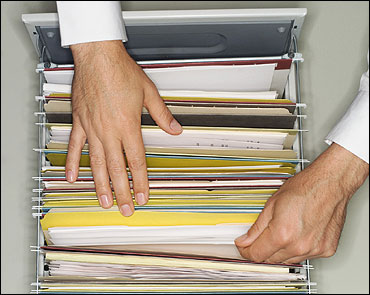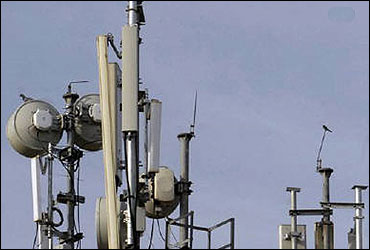 | « Back to article | Print this article |
Another telecom scam? 1994 policy files go missing
In a new twist to the 2G scam, the Department of Telecommunications (DoT) has found that crucial documents related to the telecom policy of 1994 - which heralded the entry of private companies and introduced mobile telephony - are untraceable.
The documents include the Cabinet note on the policy prepared by DoT and papers related to the decision to clear the policy by the then Congress Cabinet.
This came to light after the Comptroller & Auditor General of India (CAG) recently wrote to DoT, seeking copies of these documents for a presentation before the joint parliamentary committee (JPC) set up to investigate the 2G scam.
Click on NEXT for more...
Another telecom scam? 1994 policy files go missing
The papers are crucial for the JPC's probe into losses caused by the Bharatiya Janata Party-led government's decision to move from a fixed licence fee regime, based on the 1994 policy, to a revenue-share model introduced in the 1999 telecom policy.
A CAG report in 2000 had said the policy shift caused a substantial loss to the exchequer. It did not quantify the amount.
Communications Minister Kapil Sibal has pegged the loss at Rs 150,000 crore (Rs 1,500 billion).
The JPC has also asked telecom secretary R Chandrashekhar to quantify the loss.
Click on NEXT for more...
Another telecom scam? 1994 policy files go missing
The Cabinet secretariat, which DoT approached for copies of these documents, has told the telecom ministry that as these papers are classified, it must intensify efforts to find these.
If it fails, it should set up a committee of a deputy secretary and two under-secretaries to certify that the documents are not available despite reasonable efforts.
The report has to be sent to the cabinet secretariat.
The 1994 policy, which introduced privatisation in the telecom sector, was the basis of the decision to allow two mobile players each in Delhi, Mumbai, Kolkata and Chennai for a fixed licence fee to be paid for 10 years.
Click on NEXT for more...
Another telecom scam? 1994 policy files go missing
The companies were not selected through bids but on the basis of their record, technology compatibility, protection of national security and ability to give the best service at competitive rates.
DoT officials said the department had got one file on the 1994 policy from the Telecom Commission's office in response to a question in the Rajya Sabha.
However, the copies of the cabinet note and the decision to approve it were not found, they said.




